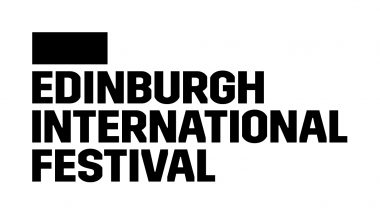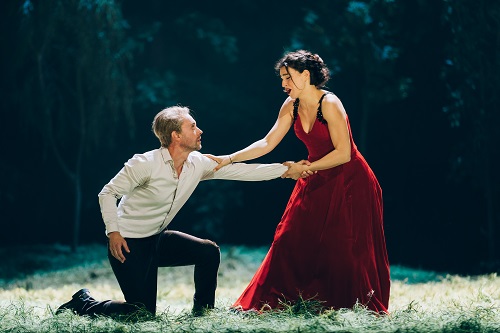
 United Kingdom Edinburgh International Festival [7] – Tchaikovsky, Eugene Onegin: Soloists, Chorus and Orchestra of Komische Oper Berlin / Ainārs Rubiķis (conductor), Edinburgh Festival Theatre, 15.8.2019. (SRT)
United Kingdom Edinburgh International Festival [7] – Tchaikovsky, Eugene Onegin: Soloists, Chorus and Orchestra of Komische Oper Berlin / Ainārs Rubiķis (conductor), Edinburgh Festival Theatre, 15.8.2019. (SRT)

Production:
Director – Barrie Kosky
Set designer – Rebecca Ringst
Costume designer – Klaus Bruns
Lighting designer – Franck Evin
Cast:
Tatyana – Asmik Grigorian
Onegin – Günther Papendell
Olga – Karolina Gumos
Lensky – Oleksiy Palchykov
Larina – Liliana Nikiteanu
Filipyevna – Margarita Nekrasova
Gremin – Dmitri Ivaschenko
Triquet – Christoph Späth
Not long ago a decent staged opera at the Edinburgh International Festival was a pretty rare thing. One way in which Fergus Linehan’s success as EIF Director can be measured is that under his tenure a powerfully involving night at the opera is no longer a surprise.
Interestingly, Barrie Kosky’s Komische Oper Berlin has been responsible for two of them. After a stunning Magic Flute in 2015, they turn to a more human story for Eugene Onegin, but the results are every bit as powerful.
Rebecca Ringst’s staging places all of the action of the first two acts in the Larins’ leafy garden, even the waltz, which takes place by torchlight. The whole floor is carpeted in grass, while a grove of trees surrounds the central revolve. It’s beautiful, and gorgeously revealed at the outset as the lights gently rise. The cold marble austerity of Prince Gremin’s palace intrudes for the opening scene of Act III, but by the final scene we’re back in the Larins’ garden, underlining both the parallel nature of Onegin and Tatyana’s journeys, and also the importance of memory and reminiscence in this opera. It’s a simple idea but a very effective one, and it’s also shrewd to place the interval after Act II, underlining the drama’s narrative in the audience’s experience.
Kosky’s real genius, however, comes in his direction of his people. This is the most warmly observed, humane Onegin I think I’ve ever seen, and that mostly comes from the interactions of the singers. Olga and Tatyana are innocent girls in the first scene, but the differences between them are reinforced by the different ways they play together. That makes Tatyana’s emotional journey all the more powerful, and the gentle joshing of Lensky and Onegin in the first scene makes their descent into animosity more shocking. I got a little fed up with the ‘comic’ antics of Filipyevna, and it’s a bathetic mistake to have both Lensky and Onegin turn up drunk for their duel, but otherwise I felt like I was watching a story told by a master.
Musically, things are superb. Günther Papendell is a first rate Onegin. He acts the part like a sexy, detached young rake, but his voice has depth, colour and seductiveness to it. It’s easy to see why Tatyana falls for him. Oleksiy Palachykov is a bright, ardent Lenksy, who sings his aria beautifully, and Karolina Gumos’ dark, throaty Olga is an excellent foil for Tatyana. Dmitri Ivashchenko sings Prince Gremin with warmth, humanity and without a twinge of irony, though Christoph Späth sounds a little off colour as Monsieur Triquet. The chorus settle into their various roles well, and the Komische Oper’s music director, Ainārs Rubiķis, conducts with shape and sense. He’s lucky to have such a superb orchestra at his disposal. The basses are so deep and rolling that you could imagine yourself in the depths of Siberia, but the winds and brass have the golden colour of central European super-musicians.
Finest of all, however, is the way Asmik Grigorian grows into the role of Tatyana. She’s astounding. Not only does she sing the role with power, lyricism and immense heart, but she embodies every part of the character’s emotional journey beautifully, from the awkward teenager of the opening to the graceful princess of the conclusion. The emotional impact of her inner conflict is written all over her acting, but Kosky reinforces this with some subtle but powerful touches, most especially having her sing the entire letter scene in a spotlight on a pitch black stage. In a situation like that there’s nowhere to hide, but Grigorian is riveting to watch, as well as to listen to. That scene on its own is incredibly powerful. Viewing it in the context of the whole evening makes it overwhelming.
Simon Thompson
The 2019 Edinburgh International Festival runs in venues across the city until Monday 26th August. For full details click here.